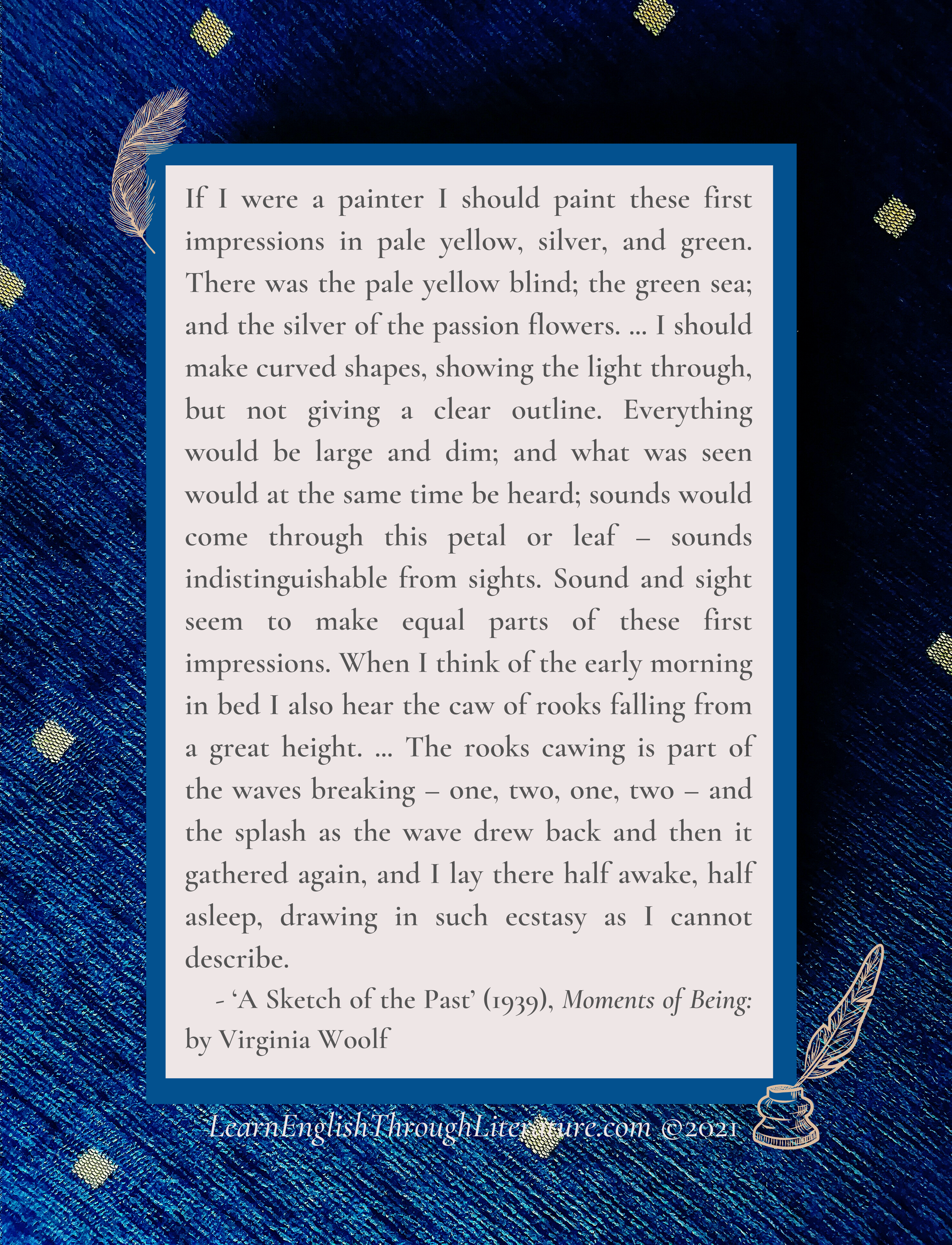In this second part of our lesson on modal verb forms ‘should/should have’, ‘could/could have’, and ‘would/would have’ to express past regrets or desires for the future, we will be focusing mainly on the differences between ‘could/could have’ and ‘would/would have’.
👉 If you would like to review our analysis of ‘should/should have’, you can find it in part 1 of today’s lesson here.
To illustrate our points, we are looking at passages from two texts by Virginia Woolf: her autobiographical memoir ‘A Sketch of the Past’ (1939) from Moments of Being, and her essay or lecture entitled A Room of One’s Own (1929).
Before we begin, here is a very brief overview of Virginia Woolf’s brilliant essay, A Room of One’s Own (1929): 🪔
It envisions the wonderful literature that could have been written by women over many centuries if they were given the financial and social support to focus on writing books full-time. Woolf imagines what life would have been like for William Shakespeare’s sister, had she been as talented as her brother and also desired to make a living from playwriting – and through this, and many other pictorial arguments, she makes a strong point of saying, ‘A woman must have money and a room of her own if she is to write fiction.’
You may already be able to guess from this introduction where and how Woolf used these modal forms!
…
📝 ‘COULD/COULD HAVE’ in ‘SKETCH OF THE PAST’
📘 ‘… The presence of my mother obsessed me. I could hear her voice, see her, imagine what she would do or say as I went about my day’s doings. She was one of the invisible presences who after all play so important a part in every life.’
– Virginia Woolf, ‘A Sketch of the Past, from Moments of Being
‘Could’ and ‘could have’ express either of the following:
📝 #1 A suggestion:
E.g. You could go shopping for clothes after Christmas – you could wait till the January sales for better discounts.
📝 #2 A polite request that emphasises the listener’s capability to do something (compare with ‘would’ below):
E.g., Could you come outside for a moment?
e.g., Could I have a word with you? (notice how it can sometimes be substituted with ‘may’ or ‘might’)
e.g., Couldn’t the teacher offer the students more revision tips for the exam?
📝 #3 ‘Can’ in the past tense, the ability in the past to do something:
E.g. ‘Before the pandemic, we could travel wherever we wanted with few restrictions.’
📝 #4 Possibility in the future:
📘 ‘… I could, if I liked to take the trouble, write a great deal here not only about my mother and father but about uncles and aunts, cousins and friends.’
– Virginia Woolf, ‘A Sketch of the Past’, from Moments of Being
…
📝 ‘WOULD/WOULD HAVE’ in A ROOM OF ONE’S OWN
📙 ‘Be that as it may, I could not help thinking, as I looked at the works of Shakespeare on the shelf, that the bishop was right at least in this; it would have been imposible, completely and entirely, for any woman to have written the plays of Shakespeare in the age of Shakespeare.’
– Virginia Woolf, A Room of One’s Own
‘Would’ or ‘would have’ indicates one of the following:
📝 #1 A polite request that emphasises the listener’s will to do something:
E.g., ‘Would you help me write this essay?’
📝 #2 ‘Will’ in the past:
E.g., ‘While her mother was alive, Virginia Woolf’s family would spend the summers in Cornwall.’
📝 #3 ‘Would’ – a hypothetical situation in the near future:
E.g., ‘If I read a word entry from that dictionary every day, I would quickly improve my vocabulary.’
📝 #4 ‘Would have’ – a hypothetical situation in the past:
E.g., 📙 ‘They would have spoken sharply but kindly, for they were substantial people who knew the conditions of life for a woman and a daughter – indeed, more likely than not she was the apple of her father’s eye.’
– Virginia Woolf, A Room of One’s Own
…
Hopefully these excerpts from Virginia Woolf’s writings – one a draft of a memoir (not published in her lifetime) and another a published lecture she gave at the University Cambridge – show you from different perspectives how to use each of these three important modal verb forms. There are subtle differences that become apparent the more you read and hear them expressed.
✍️ If you are wondering about how to practice using them, try adopting them in short sentences about yourself: what you could be doing, what you should be doing, what you would be doing if …
Remember the interesting observation we made on Woolf’s use of the modal verbs – she used them for more than polite requests, suggestions, or descriptions of the past, but also to argue for what could hypothetically be possible either in the past or in the future (subjunctive mood).
📘 ‘Nessa said that if I did not start writing my memoirs I should soon be too old.’
– Virginia Woolf, ‘A Sketch of the Past’, in Moments of Being
So don’t delay either – start using modal verb forms for yourself today!




